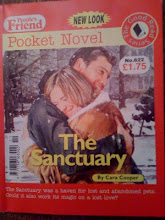Wednesday, 17 April 2013
Writing a magazine serial Part 2
Characterisation - characters are important in most stories but they are particularly key in serials. This is because these are magazine stories particularly aimed at women. Now, women like a cracking good plot as much as anyone. But women on the whole have a higher emotional IQ than men. True, they can enjoy car chases, action scenes, a stirring war tale but very often for a story to last with them, they want to know how people feel and what motivates them. Romance is a big seller and that's no coincidence - it's because people read romances in order to feel something. Now I know this is a huge generalisation and I don't want to annoy any feminists - I guess I'm one myself - I make my own decisions and have always made my own way in life. But I have often put down a book and not turned the next page, or lost interest in a film mainly because I feel nothing for the characters. In women's magazine serials the way to keep someone coming back week after week to buy the next episode is if they care about the players. They have to sympathise with them, or perhaps feel these are people who would be their friends if they met them in real life. Not to say that all your serial characters need to be likeable. They can be villains, but your villains must be interesting and believable.
One of the best ways to reveal your characters is through dialogue and this is an essential element of most serials. If there is something you can reveal through your characters' conversation, then do it, make sure we literally hear their voice. Think of all the TV series that are popular - the soaps, Morse, Downton Abbey - the characters constantly verbalise their feelings and their observations of others.
In my serial, feelings run high. It is after all, a family tale. Had it been about business though or a quest to find out a mystery feelings would still run high. In fact the only sorts of serial I think where perhaps there does not need to be so much emotion is perhaps a comic serial where the reader is kept engaged by the humour. If you can write humour, good luck to you, it is hugely popular and there is a humourous serial running at present in one of the women's mags about a group of retired amateur sleuths which is part of a series which has obviously been popular.
In my story, I had an irascible patriarch father, Salvatore, who runs a family hotel and who his staff fear. He had to be a rounded character though, his children and his wife love him, he is not a baddy, so he had to have redeeming features. After all, he has his Antonio's (our hero) respect. Antonio wants to honour his father and do his duty by helping to run the family business even though his dearest wish is to be an archaeologist. In order for Salvatore to be credible, I had to make him lovable as well as slightly dictatorial. The way I demonstrated this was that he is very much the protector of his children and his wife. Everything he does, he does with the best of motives. He's flawed but he means well. The trouble is, he's old fashioned. So, when his beautiful but wayward teenage daughter Louisa who fancies herself as a bit of a model and a flirt with the local boys gets found out by her father, sparks fly. And there you have another key to characterisation for a serial. There has to be conflict. Have you ever seen an argument in a public place, the street, or a shop? As soon as tensions run high, people stop and look wanting to know what's happening. It's the same in a serial. For through conflict comes suspicion, people behaving badly, worry, anger all those things which make a story interesting. Through the resolution of conflict comes love, redemption, forgiveness, reconciliation - all those things which make the ending of a story satisfying.
Finally, I had a wealth of different characters. They ranged in age from 14 to very elderly, they ranged from wealthy to having problems with money. They ranged from business people to lovely Italian nanas who stayed at home and did lots of cooking (just like my Italian nana did although she ran a successful catering business for many years when she was younger!) I had a fabulous looking Italian detective and a peaches and cream English nanny. The supporting characters, the people working at the hotel, the visiting relatives, a difficult neighbour - were all in their own way as important to the plot as the leading characters. That's not to say their stories overtook the leading characters, your hero and heroine are always the most important and they must remain centre stage if you are writing a romance. If you are writing a police story like a recent shorter magazine serial I read, the detectives must always remain centre stage and not be upstaged by the supporting characters. That said, supporting characters have to be painted large and to have their own individual personalities. That was true in my serial, The Lemon Grove, whether they were a wine drinking blustery Professore or a kind compassionate nana who showed them how to make homemade pasta or whether they were a teenage boy who helps to solve the crime and wants to be a detective when he leaves school. However small a part they played, they had to be written clearly so we knew why they did things and we sympathised with their plight. Then we could feel for them and want to know what happened next.
Good luck with your characters. Next week, I shall be blogging about setting in serials.
Subscribe to:
Post Comments (Atom)














7 comments:
An excellent overview of the essentials of good characterisation, Cara!
Linking to this series on my blog, thanks Cara!
I'm catching up on reading the blogs I follow and I'm delighted to see your great posts on serial writing, Cara. Thanks so much for sharing it with us. It's still my aim to write one for PF - as you know my first go ended up as a novel. Now I'm trying another and your advice is much appreciated.
Are you going to the RNA conference this year?
Glad it's been of use. Saw the second part of your two-part pocket novel in Tescs Kate, onwards and upwards eh?!
Thanks Womagwriter, truly an honour to be on your excellent blog which I read avidly, all good stuff.
Many thanks Rosemary, took me a long time and many rejections from womags with comments like, 'can't feel for your characters' to finally crack it!
Sound advice here, Cara. I agree with everything you say. I am reading a book at the mment where the characterisation is absorbing and I can't make my mind up who did what. The author has me liking and then disliking characters. Clever in every way.
Lots of good wishes for your continued success.
I love reading serials but haven't tried as yet to write one. Thanks, Cara, for the good advice on how to go about it. I'm looking forward to the next post.
Sharon
Thanks Margaret, it's very satisfying isn't it when an author keeps you guessing. Difficult to pull off effectively. Hi Sharon, lovely to meet you on here. Next post will go up next week hopefully!
Post a Comment